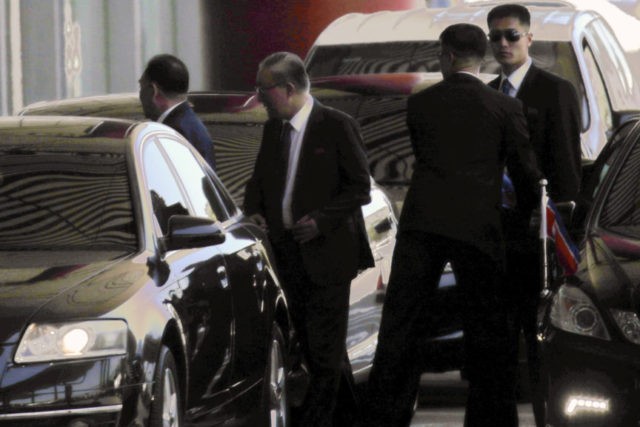The State Department, in its regular briefing Tuesday, refused to confirm whether Secretary of State Mike Pompeo would advocate for the human rights of the North Korean people while meeting with Kim Yong-chol, the highest-ranking envoy from Pyongyang to visit America in almost two decades, this week.
Kim Yong-chol is a “specially designated person” under the laws of the U.S. Treasury’s Office of Foreign Assets Control, which prohibits Americans from dealing with him generally. State Department spokesperson Heather Nauert confirmed Tuesday that any waivers necessary to make it possible for Kim to visit New York had been issued.
“North Korean Vice Chairman of the Central Committee Kim Yong-chol is arriving in New York and will meet with Secretary Pompeo later this week. We also have a U.S. delegation meeting with the North Korean delegation in the DMZ,” Nauert told reporters Tuesday. When asked what the two delegations would discuss, Nauert refused to “get into all of the nitty-gritty” of their meetings, but did confirm they were discussing different topics, both related to the scheduled June 12 meeting between President Donald Trump and dictator Kim Jong-un. She also confirmed that the State Department was planning as if the meeting was going to happen despite Trump’s letter to Kim last week canceling the summit.
On Kim Yong-chol’s travel particularly, Nauert asserted that “whatever was necessary was, in fact, done” to make it legal for Kim to enter the country and for Pompeo to engage him, despite U.S. Treasury sanctions. “There is an interagency process that allows for this kind of travel, this type of official travel to take place. We are making sure that we are in compliant with all of our own rules,” Nauert added.
Asked about the potential for human rights to be part of the discussion with the North Korean delegation, Nauert refused to confirm or deny that the topic was on the docket.
“We have a lot of very important matters to discuss with the Government of North Korea, chiefly the denuclearization of the Korean Peninsula. Beyond that, I’m not going to get into any of the specifics. We’ll see how all of this goes,” she told reporters. Pressed for a clearer answer on whether human rights will be on the table, she added, “I’m not saying that it will be; I’m not saying it won’t be. We’re just not going to get ahead of the Secretary’s meetings that start this week.”
The Trump administration has placed the issue of human rights in North Korea far down on the list of priorities in ongoing talks with the rogue communist regime. Trump and Pompeo, along with other high-ranking officials, have repeatedly stated that their goal is to negotiate a situation where North Korea ends its illegal nuclear weapons program and stops regularly threatening to destroy parts of the United States with nuclear strikes. Under Kim Jong-un, North Korea has threatened to use a nuclear weapon on Guam, San Francisco, Washington, DC, and the mainland United States generally in a pre-emptive strike.
The North Korean regime is also considered the most repressive in the world by many human rights experts. While denuclearization has remained the top priority for U.S. diplomats, the Department of State excoriated the Kim regime in its annual International Religious Freedom Report for 2017, published Tuesday. The report estimated that up to 45 percent of the Christian population of North Korea is currently toiling in the country’s sprawling concentration camps, where the Kim regime punishes crimes ranging from holding a religious belief to being suspected of insufficient enthusiasm for the Kim family. The report also accused North Korea of “arbitrary executions, political prison camps, and torture amounting to crimes against humanity.”
Kim Yong-chol, who is at press time flying to New York to meet Pompeo, has spent much of his career plotting crimes outside of North Korea. The United States designated his work at the head of North Korea’s intelligence agency “an unusual and extraordinary threat to the national security, foreign policy, and economy of the United States.” In South Korea, conservatives consider him a terrorist, most notably for allegedly orchestrating the torpedoing of the Cheonan, a South Korean navy ship, in which 46 people died. During a work trip to South Korea this year, Kim introduced himself as “the man you blame for the sinking of the Cheonan,” according to the North Korean monitor site 38 North.
“Kim Yong Chol is a diabolical war criminal who attacked the South,” the parliamentary Floor leader of South Korea’s conservative Liberty Korea Party, Kim Sung-tae, said this year following Pyongyang’s announcement it would send Kim to the 2018 Winter Olympics. “He deserves death by hanging in the street.”
Pompeo is scheduled to meet Kim either Wednesday and Thursday, depending on when he lands in the country, returning to Washington on Thursday, Nauert said.
Follow Frances Martel on Facebook and Twitter.

COMMENTS
Please let us know if you're having issues with commenting.